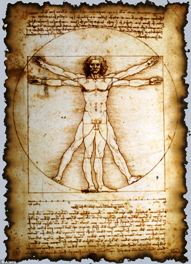What Gloucester says is in tune with the times. In Renaissance philosophy, the human was thought to be analogous to the entire cosmos, so that the human body could stand for the whole, as the masterpiece of creation.
This philosophical idea is exemplified in Leonardo da Vinci's Vitruvian Man. The 1487 drawing shows the proportions of the human body as a model for the symmetry of both the circle, a symbol for the divine, and the square, as symbol for the earthly.
